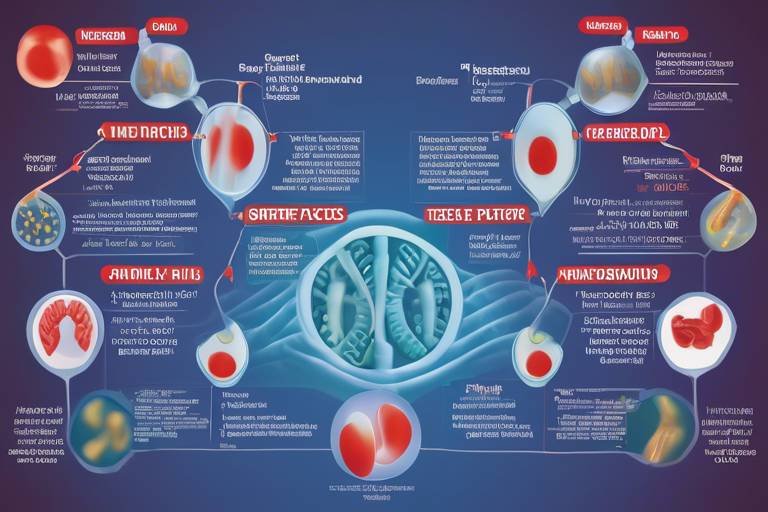The Latest Research on the Effects of Noise Pollution
Noise pollution has become an increasingly pressing issue in our modern world, especially as urban areas expand and industrial activities intensify. Recent studies have brought to light the profound impact that excessive noise levels can have on our health, environment, and society as a whole. This article aims to explore these findings, shedding light on the consequences of noise pollution and discussing potential solutions for mitigation. By understanding the sources and effects of noise pollution, we can better advocate for a quieter, healthier world.
Noise pollution refers to harmful or excessive levels of noise in the environment, often originating from urban areas, transportation, and industrial activities. Think about the constant hum of traffic, the roar of airplanes overhead, or the incessant clatter of construction work. These sounds not only disrupt our peace but can also have serious implications for our well-being. Understanding its sources and effects is crucial for addressing its impact on health and well-being. The World Health Organization (WHO) has even classified noise pollution as a significant environmental risk to public health, emphasizing the urgency of this issue.
Numerous studies link noise pollution to various health issues, including stress, sleep disturbances, and cardiovascular diseases. Imagine trying to relax in your home, only to be interrupted by the blaring of horns or the thumping of a nearby nightclub. This constant barrage can lead to a range of physiological and psychological effects. Research shows that individuals exposed to high levels of noise are more likely to experience increased anxiety, irritability, and even chronic health conditions. The implications are staggering, and it’s essential to delve deeper into the specifics of how noise pollution affects our health.
Research indicates a strong correlation between noise exposure and increased risk of heart-related conditions. Chronic noise can elevate stress hormones, leading to hypertension and other cardiovascular problems. For instance, a study published in the European Heart Journal found that individuals living near busy roads had a significantly higher risk of heart attacks and strokes. The body's response to noise is akin to a fight-or-flight reaction, where stress hormones surge, causing our heart rates to spike and blood vessels to constrict. Over time, this can lead to serious health complications.
Noise pollution significantly disrupts sleep patterns, leading to insomnia and other sleep disorders. Imagine tossing and turning at night, unable to find peace due to the relentless sounds outside your window. Research has shown that even low-level noise can interfere with sleep cycles, reducing the amount of restorative sleep we get. This not only affects our mood and productivity during the day but can also have long-term health consequences. Chronic sleep deprivation is linked to a variety of health issues, including obesity, diabetes, and weakened immune function.
Chronic exposure to noise pollution can contribute to anxiety and depression. The psychological ramifications of living in a noisy environment are profound. Studies have demonstrated that individuals in high-noise areas report higher levels of stress and lower overall life satisfaction. Just as a cluttered room can lead to a cluttered mind, constant noise can create an overwhelming mental environment, making it difficult to focus or relax. Addressing noise pollution is not just about improving physical health; it’s also a vital component of mental health strategies.
Noise pollution not only affects human health but also impacts wildlife and ecosystems. Increased noise levels disrupt animal behavior and natural habitats, leading to a decline in biodiversity. For example, birds may alter their mating calls or feeding patterns in response to urban noise, which can have cascading effects on entire ecosystems. The natural world relies on sound for communication, navigation, and survival, and when that balance is disrupted, the consequences can be dire.
Addressing noise pollution requires a multifaceted approach, including urban planning, soundproofing technologies, and community awareness. It’s not enough to simply acknowledge the problem; we need to take action. Effective strategies for reducing noise levels in various environments can include:
- Implementing zoning regulations to separate noisy industries from residential areas.
- Creating green spaces that act as sound barriers.
- Encouraging the use of quieter transportation options, such as electric vehicles.
Smart urban planning can significantly reduce noise pollution. By incorporating soundproofing measures in building designs and ensuring adequate green spaces, cities can create quieter environments. Transportation planning also plays a crucial role; for instance, designing roads with noise barriers can help shield residential areas from traffic sounds.
Raising awareness about the effects of noise pollution is vital for community engagement. Education can empower residents to advocate for noise reduction initiatives, such as stricter regulations on construction hours or promoting quieter public transport options. When communities come together to address noise pollution, the collective voice can lead to meaningful change.
Q: What are the main sources of noise pollution?
A: The primary sources include traffic, construction activities, industrial operations, and loud music or entertainment venues.
Q: How does noise pollution affect wildlife?
A: Noise pollution disrupts animal behaviors, such as mating calls and feeding patterns, which can lead to declines in species populations.
Q: What can individuals do to reduce noise pollution?
A: Individuals can advocate for quieter transportation options, use noise-canceling technologies, and promote community awareness about the effects of noise pollution.

Understanding Noise Pollution
Noise pollution refers to harmful or excessive levels of noise in the environment, often originating from various sources such as urban areas, transportation systems, and industrial activities. Imagine living in a bustling city where the sounds of honking cars, construction work, and loud music create a constant cacophony. This relentless barrage of noise can be more than just an annoyance; it can significantly affect our health and well-being. Understanding the sources and effects of noise pollution is crucial for addressing its impact on our lives.
To grasp the concept of noise pollution better, we need to consider its primary sources. These include:
- Transportation: Vehicles, airplanes, and trains contribute significantly to noise levels, especially in urban areas.
- Industrial Activities: Factories and construction sites often produce loud machinery sounds that can permeate nearby communities.
- Public Events: Concerts, sporting events, and festivals can generate significant noise, impacting surrounding neighborhoods.
These sources of noise pollution not only disrupt our daily lives but also pose serious risks to our physical and mental health. The continuous exposure to high decibel levels can lead to a range of health issues, from increased stress levels to more severe conditions like heart disease. It’s essential to recognize that noise pollution isn’t just a problem for those living in urban environments; even rural areas can experience significant noise from agricultural machinery or nearby highways.
Moreover, the effects of noise pollution extend beyond human health. It can disrupt wildlife and their habitats, leading to changes in animal behavior and even affecting reproduction rates. For instance, birds may struggle to communicate with one another in noisy environments, which can impact their mating rituals and feeding habits. Understanding these dynamics is vital for creating effective strategies to mitigate noise pollution.
In summary, noise pollution is a multifaceted issue that warrants serious attention. By acknowledging its sources and understanding its effects, we can begin to take steps toward reducing its impact on our health and the environment. The next sections will delve deeper into the specific health impacts of noise pollution, exploring how it affects our bodies and minds.

Health Impacts of Noise Pollution
Noise pollution is more than just an annoying background hum; it has profound health implications that can affect our daily lives. Numerous studies have shown that excessive noise can lead to a range of health issues, from stress to serious cardiovascular diseases. Imagine trying to relax after a long day, but the constant sound of traffic, construction, or loud music keeps your mind racing. This relentless barrage can wear down even the most resilient individuals, leading to a myriad of health problems that extend beyond mere annoyance.
One of the most concerning aspects of noise pollution is its direct link to stress-related disorders. When we are exposed to high noise levels, our bodies react in ways that are not conducive to good health. The physiological response to noise is akin to the body entering a state of alarm, triggering the release of stress hormones like cortisol. Over time, this heightened state of stress can lead to serious health conditions. In fact, a recent study highlighted that individuals living near busy roads had a significantly higher incidence of hypertension compared to those in quieter areas. This raises an important question: how many of us are unknowingly compromising our health due to the noise that surrounds us?
The relationship between noise pollution and cardiovascular health is particularly alarming. Research indicates that chronic exposure to noise can elevate stress hormones, leading to conditions such as hypertension, heart attacks, and strokes. A table summarizing key findings from various studies reveals just how serious this issue is:
| Study | Findings |
|---|---|
| Study A | Increased risk of hypertension in individuals exposed to noise levels above 65 dB. |
| Study B | Link between noise pollution and heart attacks in urban populations. |
| Study C | Correlation between sleep disturbances caused by noise and increased cardiovascular events. |
These findings underscore the need for awareness and action. If you think about it, our hearts are like finely tuned instruments; when external noise disrupts their rhythm, the consequences can be dire. It’s not merely about discomfort; it’s about our long-term health and well-being.
Another significant impact of noise pollution is its effect on sleep. Picture this: you’re trying to catch some Z’s, but the sound of honking horns or a neighbor's late-night party keeps waking you up. This disruption can lead to insomnia and a host of other sleep disorders. Research shows that noise levels above 30 dB can interfere with sleep quality, leading to fragmented rest and daytime fatigue. When we don’t get enough quality sleep, our bodies struggle to recover, which can exacerbate existing health issues and even lead to new ones.
The psychological ramifications of noise pollution are equally concerning. Chronic exposure can contribute to feelings of anxiety and depression. Imagine living in a constant state of alertness, where every loud sound triggers a stress response. This relentless tension can take a toll on mental health, making it essential to address noise pollution as part of any comprehensive mental health strategy. Studies have shown that individuals in noisy environments report higher levels of anxiety and lower overall life satisfaction. It's a cycle that needs to be broken, and awareness is the first step.
In conclusion, the health impacts of noise pollution are real and far-reaching. From cardiovascular risks to sleep disruption and mental health effects, the consequences are too significant to ignore. As we become more aware of these issues, it’s crucial to advocate for changes that can improve our living environments and, ultimately, our health.
- What is noise pollution? Noise pollution refers to harmful or excessive levels of noise in the environment, often originating from urban areas, transportation, and industrial activities.
- How does noise pollution affect health? It can lead to stress, sleep disturbances, cardiovascular diseases, and mental health issues.
- What are some ways to mitigate noise pollution? Effective strategies include urban planning, soundproofing technologies, and community awareness initiatives.

Cardiovascular Risks
When we think about the factors that can affect our heart health, we often consider diet, exercise, and genetics. However, noise pollution is an insidious player in this game that many people overlook. Research has shown that chronic exposure to high levels of noise can significantly increase the risk of cardiovascular diseases. Imagine living in a bustling city where the sounds of traffic, construction, and nightlife never seem to fade. This constant barrage of noise can lead to elevated stress hormones, particularly cortisol, which wreaks havoc on our bodies.
Studies have revealed that individuals living in noisy environments are at a higher risk of developing conditions such as hypertension, heart attacks, and even strokes. The body responds to noise much like it would to physical danger; it goes into fight-or-flight mode. Over time, this heightened state of alertness can take a toll on the cardiovascular system. The following are some key points to consider:
- Elevated Blood Pressure: Continuous exposure to loud noise can lead to persistent increases in blood pressure, a significant risk factor for heart disease.
- Increased Heart Rate: Noise can cause the heart to beat faster, which can strain the cardiovascular system over time.
- Chronic Stress Response: The body releases stress hormones in response to noise, leading to inflammation and other health issues.
Furthermore, a study published in the European Heart Journal found that people living near busy roads were 20% more likely to suffer from heart-related issues compared to those in quieter areas. This correlation is alarming and highlights the need for more awareness about the impact of our noisy surroundings.
But it’s not just the volume of noise that matters; the type of noise plays a role too. For instance, the sound of traffic is often more harmful than a pleasant background hum. It’s like comparing a gentle stream to a roaring waterfall—one soothes, while the other stresses. The body’s response to different types of noise can vary, making it essential to understand the nuances of how we are affected.
In conclusion, the cardiovascular risks associated with noise pollution are profound and far-reaching. As we continue to urbanize and our environments grow noisier, it’s crucial to recognize the hidden dangers that come with it. It’s not just about finding peace and quiet; it’s about safeguarding our heart health. So, the next time you find yourself in a noisy environment, consider taking steps to mitigate that exposure. Whether it’s using earplugs, seeking quieter spaces, or advocating for community noise reduction initiatives, every little bit counts.
Q1: How does noise pollution affect heart health?
A1: Noise pollution can lead to elevated stress hormones, increased blood pressure, and a higher heart rate, all of which contribute to cardiovascular diseases.
Q2: What are some common sources of noise pollution?
A2: Common sources include traffic, construction activities, loud music, and industrial operations.
Q3: Can noise pollution be reduced?
A3: Yes, through urban planning, soundproofing technologies, and community awareness initiatives, noise pollution can be mitigated.

Sleep Disruption
Have you ever tried to catch some Z's, only to be jolted awake by the blaring sound of a car horn or the distant rumble of construction work? If so, you're not alone. Noise pollution is a sneaky culprit that can wreak havoc on your sleep patterns, leaving you tossing and turning instead of peacefully drifting off into dreamland. Studies have shown that even moderate noise levels can significantly disrupt sleep, leading to a cascade of negative effects on both your physical and mental health.
So, how does noise pollution disrupt our precious sleep? It all boils down to our body's natural response to sound. When we hear sudden noises, our brain is wired to react—it's a survival instinct. This reaction triggers the release of stress hormones like cortisol, which can keep us alert and on edge, making it difficult to relax and fall asleep. Consequently, even if you're not fully awake, these disturbances can lead to fragmented sleep, preventing you from reaching the deeper, restorative stages of slumber that are crucial for rejuvenation.
Research has indicated that individuals living in noisy urban environments often experience higher rates of insomnia and other sleep disorders. One study found that people exposed to high levels of nighttime noise were more likely to report poor sleep quality and daytime fatigue. This can create a vicious cycle: lack of sleep can lead to increased irritability, decreased productivity, and even heightened sensitivity to noise, making it even harder to get a good night's rest.
To further illustrate the impact of noise on sleep, consider the following statistics:
| Noise Level (dB) | Sleep Quality Impact |
|---|---|
| 30-40 dB | Minimal impact; generally considered quiet |
| 50-60 dB | Moderate impact; can disrupt light sleep |
| 70+ dB | Severe impact; can lead to frequent awakenings |
It's clear that the louder the environment, the more pronounced the effects on sleep quality. So, what can be done to combat this pervasive issue? Here are some strategies to consider:
- Soundproofing: Invest in soundproof windows or heavy curtains to minimize external noise.
- White Noise Machines: These devices can help mask disruptive sounds, creating a more peaceful sleeping environment.
- Establish a Sleep Routine: Going to bed and waking up at the same time every day can help regulate your sleep cycle, making it easier to fall asleep despite external noise.
In conclusion, the impact of noise pollution on sleep is a significant concern that warrants attention. By recognizing the effects and implementing strategies to mitigate noise, we can improve our overall sleep quality and, by extension, our health and well-being. Remember, a good night's sleep is not just a luxury; it's a fundamental requirement for a healthy life.

Mental Health Effects
The impact of noise pollution on mental health is a growing concern, and recent studies have brought this issue to the forefront. Imagine trying to concentrate on a project or unwind after a long day, only to be interrupted by the incessant honking of cars, the rumble of construction, or the chatter of a nearby crowd. This constant barrage of sound can lead to significant psychological distress. Research indicates that chronic exposure to high noise levels can elevate feelings of anxiety and depression. People living in noisy environments often report higher levels of irritability and mood swings, which can severely affect their quality of life.
One of the mechanisms through which noise affects mental health is by disrupting our natural ability to focus. When our brains are bombarded with distracting sounds, it becomes increasingly difficult to concentrate on tasks, leading to a sense of overwhelm. This can create a vicious cycle: as stress levels rise due to noise, our ability to cope diminishes, further exacerbating mental health issues. A study revealed that individuals exposed to noise pollution were more likely to experience symptoms of mental health disorders, highlighting the urgent need for awareness and intervention.
Moreover, the effects of noise pollution are not just limited to adults; children are particularly vulnerable. Their developing brains are sensitive to environmental stressors, and exposure to high noise levels can hinder cognitive development, leading to issues with learning and behavior. For instance, a child trying to study in a noisy environment may struggle to retain information, which can have long-term implications for their academic performance.
To put it into perspective, consider the following points regarding noise pollution and mental health:
- Increased Stress Levels: Exposure to noise can trigger the body's stress response, leading to elevated cortisol levels.
- Social Withdrawal: Individuals may retreat from social interactions due to the discomfort caused by noise, leading to isolation.
- Disrupted Daily Activities: Everyday tasks, such as reading or relaxing, can become challenging in noisy environments.
Addressing the mental health effects of noise pollution is crucial. It requires a combination of individual and community efforts to create quieter, more peaceful living spaces. Simple actions, such as advocating for soundproofing in homes, promoting noise-reducing urban designs, and encouraging local governments to implement stricter noise regulations, can make a significant difference. By raising awareness and fostering community engagement, we can combat the detrimental effects of noise pollution on mental health.
- What is noise pollution? Noise pollution refers to harmful or excessive levels of noise that disrupt the natural sound environment, often caused by urbanization, transportation, and industrial activities.
- How does noise pollution affect mental health? Chronic exposure to noise can lead to increased anxiety, depression, and stress, affecting overall mental well-being.
- What can be done to mitigate noise pollution? Solutions include urban planning, community awareness, soundproofing technologies, and advocating for quieter environments.
- Are children more affected by noise pollution? Yes, children are particularly vulnerable to the effects of noise pollution, which can hinder their cognitive development and learning abilities.

Environmental Consequences
When we think about pollution, our minds often gravitate towards the more visible forms, like smog and litter. However, noise pollution is a silent but equally destructive force that has far-reaching consequences for our environment. Just as a pebble creates ripples in a pond, noise can disrupt the delicate balance of ecosystems, affecting not only humans but also wildlife and their habitats.
Imagine a serene forest, where the gentle rustle of leaves and the chirping of birds create a symphony of natural sounds. Now, picture that tranquility shattered by the incessant roar of traffic or the blaring of construction equipment. This cacophony can lead to a range of environmental issues, primarily by altering animal behavior and disrupting communication among species. For instance, many animals rely on sound for mating calls, navigation, and warning signals. When noise levels rise, these critical functions can be impaired, leading to population declines and even local extinctions.
Moreover, the impact of noise pollution extends beyond just the immediate vicinity of its source. It can create a ripple effect that alters entire ecosystems. For example, studies have shown that increased noise levels can cause birds to change their nesting sites, leading to a cascade of consequences for the food web. When birds migrate to quieter areas, they may leave behind their natural predators, which can lead to an overpopulation of certain species and a decline in others. The balance of nature is fragile, and noise pollution can tip the scales in favor of chaos.
Additionally, aquatic ecosystems are not immune to the effects of noise. Underwater noise pollution, primarily from shipping and industrial activities, can interfere with the communication of marine animals, such as whales and dolphins. These magnificent creatures rely on sound for navigation and social interaction. When their environment becomes too noisy, it can lead to disorientation, stress, and even strandings. The consequences are dire, not just for the individual animals, but for the entire marine ecosystem.
The following table summarizes some of the key environmental impacts of noise pollution:
| Impact | Description |
|---|---|
| Disruption of Animal Behavior | Noise can interfere with mating, feeding, and communication among wildlife. |
| Habitat Alteration | Animals may abandon their natural habitats in search of quieter areas. |
| Population Declines | Increased stress and altered behaviors can lead to lower reproduction rates. |
| Impact on Marine Life | Underwater noise affects navigation and social interactions in marine species. |
In conclusion, the environmental consequences of noise pollution are profound and multifaceted. It's not just about the annoyance of loud sounds; it's about the very fabric of our ecosystems being unraveled. As we continue to urbanize and industrialize, it’s essential to recognize the hidden costs of our noise-filled lives. By being mindful of our surroundings and advocating for quieter, more sustainable practices, we can help protect the delicate balance of nature that sustains us all.
- What is noise pollution? Noise pollution refers to harmful or excessive levels of noise in the environment, often originating from urban areas, transportation, and industrial activities.
- How does noise pollution affect wildlife? Noise pollution disrupts animal behavior, communication, and habitats, leading to population declines and ecosystem imbalances.
- Can noise pollution impact human health? Yes, prolonged exposure to noise pollution can lead to various health issues, including stress, sleep disturbances, and cardiovascular diseases.
- What can be done to reduce noise pollution? Effective strategies include smart urban planning, soundproofing technologies, and raising community awareness about the impacts of noise.

Mitigation Strategies
Addressing noise pollution is not just about complaining; it's about taking action! This multifaceted issue requires a comprehensive approach that combines urban planning, innovative technologies, and community involvement. Imagine living in a city where the hustle and bustle doesn’t invade your peace—sounds like a dream, right? Well, it can be a reality with the right strategies in place.
One of the most effective ways to tackle noise pollution is through urban planning. Cities can design their layouts to minimize noise exposure by implementing zoning regulations that separate residential areas from noisy industrial zones. Additionally, incorporating green spaces like parks and gardens can act as natural sound barriers, absorbing and deflecting noise. Just think of a serene park filled with trees; not only does it provide a beautiful escape, but it also serves as a buffer against the chaos of city life.
Moreover, enhancing transportation planning is crucial. By investing in public transport, cities can reduce the reliance on personal vehicles, which are notorious for contributing to noise pollution. Imagine a city where electric buses glide silently through the streets, reducing both air and noise pollution. This not only improves the quality of life for residents but also promotes a healthier environment.
Another vital aspect is the use of soundproofing technologies. For instance, buildings can be constructed with sound-absorbing materials that significantly reduce noise intrusion from outside. This is especially important for homes and offices located near busy roads or industrial areas. In fact, studies have shown that buildings equipped with proper soundproofing can lower noise levels by up to 30 decibels!
Community awareness and advocacy play a significant role in noise reduction as well. When residents understand the impacts of noise pollution, they are more likely to engage in initiatives aimed at reducing it. Community workshops, local campaigns, and social media outreach can help educate individuals about the importance of maintaining a quieter environment. For example, organizing neighborhood clean-up days can also serve as an opportunity to discuss noise issues and brainstorm solutions together.
In summary, mitigating noise pollution is a collective responsibility that requires a blend of smart urban planning, advanced technologies, and active community participation. By working together, we can create quieter, more peaceful environments that enhance our quality of life. After all, who wouldn’t want to live in a place where the sounds of nature drown out the clamor of traffic?
- What are the main sources of noise pollution? Noise pollution mainly comes from transportation (cars, trains, airplanes), industrial activities, and urban development.
- How does noise pollution affect health? Prolonged exposure to noise can lead to stress, sleep disturbances, cardiovascular diseases, and mental health issues.
- What are some simple ways to reduce noise pollution at home? You can use soundproofing materials, keep windows closed during noisy hours, and create quiet zones in your home.
- Can urban planning really make a difference? Absolutely! Thoughtful urban design can create quieter neighborhoods by incorporating green spaces and separating noisy areas from residential zones.

Urban Planning Solutions
When it comes to tackling the pervasive issue of noise pollution, urban planning plays a pivotal role. Imagine a city where the hustle and bustle is harmonized with nature, where the cacophony of traffic is replaced by the gentle rustle of leaves. Smart urban planning can transform this vision into reality, significantly reducing noise levels and enhancing the quality of life for residents.
One of the most effective strategies in urban planning is the implementation of zoning regulations. By designating specific areas for residential, commercial, and industrial use, cities can minimize the clash between noisy industries and peaceful neighborhoods. For instance, placing factories and warehouses away from residential zones can dramatically lower the noise levels experienced by families. Moreover, establishing buffer zones that include parks and green spaces can act as sound barriers, absorbing and deflecting noise away from sensitive areas.
Another important aspect is the integration of green spaces within urban environments. Parks, gardens, and tree-lined streets not only provide aesthetic benefits but also serve as effective noise dampeners. The leaves and branches of trees can absorb sound, while the open spaces allow for sound dispersion. A study found that cities with ample green spaces experience lower noise pollution levels compared to those that lack them. It’s like having a natural soundproofing system!
Transportation planning also plays a crucial role in mitigating noise pollution. By promoting public transportation systems, cities can reduce the number of cars on the road, thereby decreasing traffic noise. Additionally, implementing sound barriers along highways and busy roads can shield nearby communities from the relentless roar of vehicles. These barriers can be designed creatively, incorporating art and landscaping to enhance the urban aesthetic while serving their functional purpose.
Moreover, the use of quiet pavement technology is gaining traction in urban planning. This innovative solution involves using materials that absorb sound rather than reflect it, leading to a significant reduction in noise from road traffic. Cities that have adopted quiet pavement have reported noticeable decreases in noise levels, contributing to a more tranquil urban atmosphere.
In conclusion, urban planning solutions are essential in the fight against noise pollution. By prioritizing zoning regulations, creating green spaces, enhancing transportation systems, and adopting innovative technologies, cities can pave the way for a quieter, healthier future. As we continue to grow and develop urban areas, it is crucial to remember that the soundscape of our environment significantly impacts our well-being.
- What is noise pollution? Noise pollution refers to harmful or excessive levels of noise in the environment, often stemming from urban activities, transportation, and industrial processes.
- How does noise pollution affect health? Prolonged exposure to noise pollution can lead to various health issues, including stress, sleep disturbances, cardiovascular diseases, anxiety, and depression.
- What are some urban planning solutions to reduce noise pollution? Effective urban planning solutions include zoning regulations, creating green spaces, enhancing public transportation, and implementing quiet pavement technologies.
- Can green spaces really help reduce noise? Yes, green spaces can absorb sound and act as natural sound barriers, significantly lowering noise levels in urban areas.
- How can communities advocate for noise pollution reduction? Communities can raise awareness through education, engage in advocacy efforts, and collaborate with local governments to implement noise reduction initiatives.

Community Awareness and Advocacy
When it comes to tackling the issue of noise pollution, community awareness and advocacy play a pivotal role. Imagine living in a neighborhood where the sounds of nature are drowned out by incessant traffic and construction noise. It's not just an annoyance; it's a health hazard. By raising awareness about the detrimental effects of noise pollution, communities can mobilize to take action. But how do we ignite that spark of awareness? It starts with education.
Educational campaigns can be powerful tools in informing the public about the risks associated with noise pollution. Workshops, seminars, and community forums can empower residents with knowledge about how noise affects their health and well-being. For instance, did you know that prolonged exposure to high noise levels can increase stress, disrupt sleep, and even lead to cardiovascular diseases? By highlighting these facts, we can encourage individuals to advocate for quieter environments.
Moreover, community advocacy groups can serve as the backbone of these efforts. These groups can organize events, such as noise awareness days, where residents come together to discuss their experiences with noise pollution and brainstorm solutions. This collective effort can amplify voices, making it clear to local authorities that noise pollution is a serious issue that requires immediate attention. When communities unite, they can influence policy changes and push for stricter regulations on noise levels.
One effective strategy for advocacy is to utilize social media platforms to spread the message. By sharing personal stories, statistics, and infographics, communities can reach a wider audience and raise awareness beyond their immediate neighborhoods. Engaging campaigns can encourage residents to share their experiences with noise pollution, creating a ripple effect that fosters a sense of urgency and collective responsibility.
Additionally, collaboration with local governments can lead to meaningful change. Communities can advocate for the implementation of noise barriers, stricter zoning laws, and the promotion of green spaces that naturally absorb sound. For example, planting trees along busy roads not only beautifies the area but also acts as a natural sound barrier. The more residents engage with their local government, the more likely they are to see tangible changes in their environment.
In summary, community awareness and advocacy are essential in combating noise pollution. By educating residents, organizing collective efforts, leveraging social media, and collaborating with local authorities, communities can create a quieter, healthier living environment for all. After all, a little noise can lead to a lot of problems, but together, we can turn down the volume.
- What are the main sources of noise pollution? Noise pollution primarily originates from urban areas, transportation (like cars, trains, and airplanes), construction activities, and industrial operations.
- How does noise pollution affect health? Prolonged exposure to high noise levels can lead to various health issues, including stress, sleep disturbances, cardiovascular diseases, and mental health problems.
- What can communities do to reduce noise pollution? Communities can engage in educational campaigns, advocate for stricter noise regulations, promote green spaces, and collaborate with local governments to implement noise-reducing measures.
- Is there a legal limit for noise pollution? Yes, many cities have established noise ordinances that set legal limits on acceptable noise levels, especially during nighttime hours.
Frequently Asked Questions
-
What is noise pollution?
Noise pollution refers to harmful or excessive levels of noise in the environment, often arising from urban areas, transportation, and industrial activities. It can disrupt daily life and negatively impact health and well-being.
-
How does noise pollution affect health?
Numerous studies have linked noise pollution to various health issues, including stress, sleep disturbances, and cardiovascular diseases. Prolonged exposure can elevate stress hormones, leading to hypertension and other serious conditions.
-
Can noise pollution disrupt sleep?
Absolutely! Noise pollution significantly disrupts sleep patterns, leading to insomnia and other sleep disorders. Even low levels of noise can interfere with the quality of sleep, which is crucial for overall health.
-
What are the mental health effects of noise pollution?
Chronic exposure to noise pollution can contribute to anxiety and depression. The constant barrage of noise can create a stressful environment, making it vital to consider noise reduction in mental health strategies.
-
How does noise pollution affect wildlife?
Noise pollution impacts not just humans but also wildlife and ecosystems. Increased noise levels can disrupt animal behavior, interfere with communication, and lead to habitat loss, affecting biodiversity.
-
What are some effective strategies to mitigate noise pollution?
Addressing noise pollution requires a multifaceted approach, including smart urban planning, soundproofing technologies, and community awareness. Zoning regulations and the creation of green spaces can significantly help in reducing noise levels.
-
How can communities raise awareness about noise pollution?
Community engagement is key! Advocacy and education about the effects of noise pollution can lead to collective efforts in noise reduction initiatives. Hosting workshops, creating informative campaigns, and encouraging local discussions can make a difference.



















